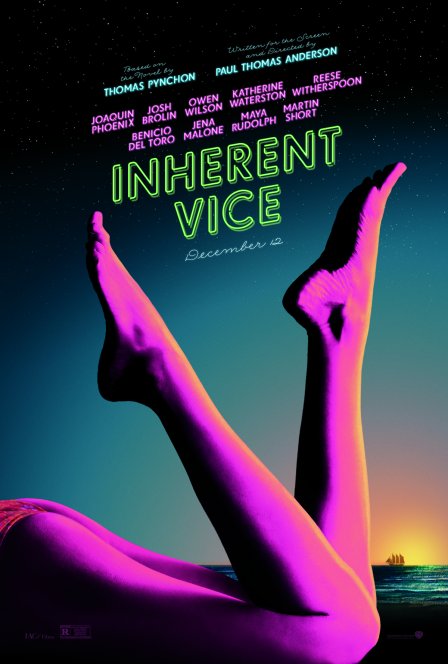There probably aren’t any ghosts in Inherent Vice, but there are legions of specters. Denis (Jordan Christian Hearn), the ephemeral right-hand man of stoner private detective Doc Sportello (Joaquin Phoenix), shows up once in a while wielding a dismantled steering wheel or a craving for food. Sortilège (Joanna Newsom) narrates some of the film’s action and all of its astrological undercurrents, but only appears in flashbacks or when Denis is around. Activist groups, political figures, cult movements and cultural artifacts might control some strands of the film’s plot, but mainly seem to prowl around the margins of Inherent Vice’s thick atmospheric stew. There’s an innocence to these figures, who exist in a moment just before idealism crumbles in the face of cynicism and corruption. Paul Thomas Anderson’s lovingly conceived adaptation of Thomas Pynchon’s 2009 spin on 1970s California grooves on that moment, part detective story, part absurdist comedy, part liberal lament.
But then there’s Shasta Fay Hepworth (Katherine Waterston), Doc’s ex-girlfriend. She drifts into the film through flashbacks, a dissolve that turns out to be a superimposition — Robert Elswit is behind the lens, so a few quietly staggering things like this happen — and a couple of long conversations in Doc’s apartment. Shasta is a tricky figure, both a callback and a portent: she’s got the calculated manner of a femme fatale, the sad aura of an endangered lover, and the sense that she’s seen an ugly future she can’t stop and might not be able to turn away from.
Shasta sets Inherent Vice’s intricately shaggy plot in motion, informing Doc of the disappearance of real-estate mogul Mickey Wolfmann (Eric Roberts) at the hands of some elusive but well-connected operators. Not too long after, an ex-convict associated with the Black Guerrilla Family (Michael Kenneth Williams) asks Doc to track down a white supremacist friend who’s also an associate of Wolfmann. Then an ex-junkie (Jena Malone) adds a third missing person to the mix, a surf-jazz saxophonist named Coy Harlingen (Owen Wilson) who seems at once ubiquitous and irrelevant to the film’s trajectory. Wading through a morass of leads and shady businesses, Doc gets some help through official channels from his new flame, Assistant D.A. Penny Kimball (Reese Witherspoon), and some flack from a proto-Reaganite ball-buster, Lt. Det. Christian F. “Bigfoot” Bjornsen (Josh Brolin). He also solicits pro bono work from maritime law specialist Sauncho Smilax (Benicio Del Toro) over a meal of tequila zombies and jellyfish teriyaki croquettes.
I’m at a loss to explain how Inherent Vice gets to him, but I haven’t even mentioned the coke-snarfing, sex-crazed dentist Rudy Blatnoyd, played by Martin Short, who may run the syndicate who may be behind all these doings. Or the weird scenester party that ends in a bizarre recreation of the Last Supper, its dinner table lined with pizzas. This is, as enough reviews leaden with weed puns have established, a film that’s easier to experience than it is to summarize, fun as it is to type out these astounding monikers. Characters seem lit by campfire in the gorgeous SoCal dusk, and Inherent Vice’s soft light is as hazy as its sound mix. Jonny Greenwood’s dextrous, typically great score takes a backseat to a handful of on-point cues of Vitamin C and Neil Young. Anderson pulls in a few tricks from his freewheeling early features — setting his camera on closing car doors, riffing on popular culture — but naturally integrates them into a film that mostly sustains the totality of vision that bolstered his past two films, There Will Be Blood and The Master.
The overall tone doesn’t so much juggle farce, ode, and elegy as it gradually fuses them all into one uncanny wavelength. (Along with the superficial genre self-referentiality, this is why it’s worth comparing to Robert Altman’s Long Goodbye.) When Doc investigates the scene at Wolfmann’s new housing complex in the desert, he finds a sex business called Chick Planet Massage and then gets comically bashed in the head. He wakes up in the sand next to a dead man, looking up at a strand of flapping red triangles out of a shitty car dealership, then sits up to see a fleet of cops ready to take him to the station. Anarchic comedy, societal transgression, unrelenting development, and overwhelming authority are always in close proximity. Early tête-à-têtes between Phoenix and Brolin are masterpieces of odd-couple comedy, but they also mark a clash of ideals: Doc Sportello seeks truth, doesn’t care about money, and seems to hope for an American way that stays out of his hair; Bigfoot Bjornsen, “Renaissance cop,” craves success and admiration as he grapples with mid-century crises of masculinity. Their gags about civil rights violations have some teeth, as does their simultaneously absurdist and tragic final meeting.
The singularity of Anderson’s vision encounters a couple of hiccups. Owen Wilson plays things the wrong kind of goofy, acting like he’s been plucked out of an equally busy film by that other virtuosic Anderson. I’m more ambivalent about Shasta, the film’s narrative linchpin and the primary object of Doc Sportello’s longing. Waterston makes an immediate and alluring impression in her first scene, but one long, impressive shot in Doc’s apartment plays like a cheap male fantasy, Waterston droning on to distraction while baring all for the audience. If these moments don’t work — that is, if they disrupt Inherent Vice’s carefully cultivated groove — they at least have the upside of highlighting the wonder of the rest of the film, where Pynchon’s complex and mannered dialogue flows easily out of the mouths of a couple dozen actors happily under the spell of one of our great directors.

